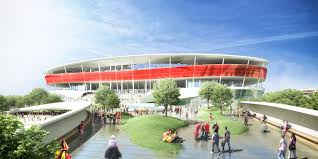By Samindra Kunti
February 2 – Brussels’s EURO2020 stadium may face delays in construction after an environmental report cast doubt over the viability of the venue. The projected public funding of €432 million is also raising eyebrows.
In September 2014 UEFA beat the drum for their pan-european vision of EURO2020 by announcing the 13 host cities and respective venues for the tournament. Suspended UEFA president Michel Platini coined the tournament as a ‘romantic’ one-off to celebrate the 60th birthday of the European Championship.
Brussels was chosen ahead of Cardiff to host group matches and a round of 16 match.
With the King Baudouin Stadium outdated, Belgium proposed the ‘Eurostadium’, a state-of-the-art all-seater stadium on the outskirts of Brussels as the venue for EURO2020 with a construction delivery date in 2019. The council of Brussels proceeded to choose the Ghelamco consortium as the candidate to finance, build and operate the stadium.
The stadium would host matches of Belgium’s national team and RSC Anderlecht, Brussels’s biggest and Belgium’s most decorated club. Club Brugge opposed the Eurostadium, citing disproportional benefits for Anderlecht.
Yet the prestigious project – Belgium boasts just one respectable stadium with the Ghelamco Arena in Ghent – is facing an uphill struggle from the start. An environmental report underlines that the transport circulation around the stadium, near Brussels’s ring road, will be precarious with a predicted surge in traffic jams. The projected construction of Neo, a new neighborhood and shopping district in lieu of the old King Baudouin Stadium, would add to the congestion.
Ghelamco must submit additional documents to address the matter before the Flemish government wants to consider granting an environmental license. The consortium had intended to commence construction during spring, but that might now be delayed.
UEFA has warned that Brussels must meet the delivery deadline of 2019.
The stadium is also facing opposition over public funding. Local politicians repeatedly stated in the Brussels parliament that the new stadium wouldn’t cost the Belgian tax payer a penny, but such claims may not be true: the Brussels council, the Brussels region and the Flemish government will invest €80 million in the parking, €123 million in the exploitation of the stadium, €150 million in access roads, €33 million in security, €45 million in lease and €1.3 million in legal fees, according to local newspaper Het Laatste Nieuws.
Contact the writer of this story at moc.l1745254158labto1745254158ofdlr1745254158owedi1745254158sni@i1745254158tnuk.1745254158ardni1745254158mas1745254158

